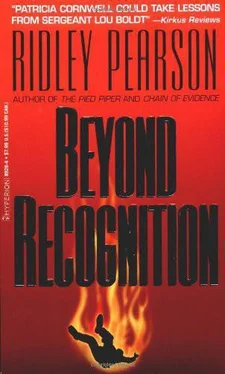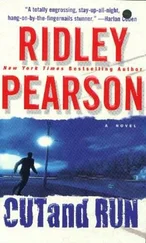Ridley Pearson - Beyond Recognition
Здесь есть возможность читать онлайн «Ridley Pearson - Beyond Recognition» весь текст электронной книги совершенно бесплатно (целиком полную версию без сокращений). В некоторых случаях можно слушать аудио, скачать через торрент в формате fb2 и присутствует краткое содержание. Жанр: Триллер, на английском языке. Описание произведения, (предисловие) а так же отзывы посетителей доступны на портале библиотеки ЛибКат.
- Название:Beyond Recognition
- Автор:
- Жанр:
- Год:неизвестен
- ISBN:нет данных
- Рейтинг книги:5 / 5. Голосов: 1
-
Избранное:Добавить в избранное
- Отзывы:
-
Ваша оценка:
- 100
- 1
- 2
- 3
- 4
- 5
Beyond Recognition: краткое содержание, описание и аннотация
Предлагаем к чтению аннотацию, описание, краткое содержание или предисловие (зависит от того, что написал сам автор книги «Beyond Recognition»). Если вы не нашли необходимую информацию о книге — напишите в комментариях, мы постараемся отыскать её.
Beyond Recognition — читать онлайн бесплатно полную книгу (весь текст) целиком
Ниже представлен текст книги, разбитый по страницам. Система сохранения места последней прочитанной страницы, позволяет с удобством читать онлайн бесплатно книгу «Beyond Recognition», без необходимости каждый раз заново искать на чём Вы остановились. Поставьте закладку, и сможете в любой момент перейти на страницу, на которой закончили чтение.
Интервал:
Закладка:
He wasn’t sure exactly why, but she made him write one page in a diary every day. If he wrote in the diary, he didn’t have to sit down and talk to her at night-only to the other woman, Susan, during the day. To avoid the extra talking, he did the writing. She had told him he could write about anything-school, home, Emily’s, his dreams-or he could make up a story.
The night before, he had dreamed about being part of an Egyptian archaeological dig, like on the National Geographic specials. He had to crawl on his belly inside the pyramid, crawl over rocks and dirt and mud. It reminded him of Indiana Jones. And when he got to the tomb, there was all this gold-gold rings of every size-and a mummy of the queen, all wrapped up in gauze. And when he unwrapped the mummy, it was his mother’s face. Frightened, he had run from the place, leaving all the gold behind. Losing his way. He had awakened right there on that fold-out couch.
He put his pencil on the third page of the diary and began to slowly scrawl out his dream.
Last nite I dreamed I was in Egipt….
36
Boldt likened an investigation to an enormous rock or boulder on the summit of a mountain. Initially, the investigator’s job was to climb that mountain, gathering up whatever tools made themselves available-whatever evidence could be found. Reaching the rock, tools in hand, the investigator went about trying to leverage the rock, summoning whatever size team was necessary. Together, the team went about the job of displacing the rock, prying, pushing, shoving. The better organized the team, the better directed, the quicker the boulder gave way. Once displaced, the investigation was rolled toward the edge, given one final push, and gravity took over, at which point the task was to stay with it-all teammates pursuing it simultaneously-a mad, frantic race down hill in the midst of a landslide created by the beast itself. The job at hand by now: to keep the rock from exploding into bits at the bottom.
Boldt was caught in that landslide.
He didn’t recognize it at first, and this typically proved the most difficult task of all-understanding what phase of the investigation one was in-for inevitably some of the team were still uphill with the pry bars while the rock itself was hurling toward the bottom. The possible involvement of the psychic’s military man with the burned hand, the ATF lab’s suggestion of rocket fuel as the accelerant, and finally Garman’s purchase of a Werner ladder had sent the rock tumbling downhill. At that point it became Boldt’s job to stay with it, to shape the investigation into something manageable. That task was made more difficult by two subsequent occurrences.
The first was Garman’s receipt of a fourth poem and piece of green plastic-this following his interrogation. Was he brazenly taunting the police, Boldt wondered-or was he, as he claimed, an innocent go-between?
The second was a phone call received by Daphne from Emily Richland on that same day. She hurried into the bullpen, out of breath from having run downstairs from the ninth floor. Her voice was frantic, her words rushed as she shouted, “That was her! Emily! Nick, the guy with the burned hand, just made an appointment with her for five o’clock today. That’s only two hours from now. Can we handle it?”
Boldt felt an immediate knot of tension, from his stomach to his pounding head. Two hours, he wondered. Surveillance, ERT, bomb squad-a repeat of the team assembled just over a week earlier. Branslonovich was barely in her grave. His memory of that spectral vision haunted him. “We’ll try,” he said.
37
At 4:49 P.M., a bald-headed man wearing khakis and ankle-high deck shoes came out through the front door of the purple house on 21st Avenue East. The detectives had nicknamed him the General. The General wore wire-rimmed glasses and a blue beret. He carried a small brown leather briefcase as he walked briskly to a nondescript station wagon and drove off. The briefcase had contained a lavaliere condenser microphone and a battery-powered wireless radio transmitter, presently taped to the bottom of Emily’s “reading” table. A wide-angle black-and-white fiber-optic camera was installed into the kitchen peephole, giving those in the operations van a look at Emily’s back and shoulders and a slightly distorted fish-eye view of the face of her client. The video’s transmitter was connected to a Direct TV dish mounted on the outside of the purple house.
The operations van, the same steam-cleaning van used less than a week before, was parked a block down 21st.
A FOR SALE sign had been placed on the lawn of the adjacent house. Above the sign was a small plaque announcing OPEN HOUSE, complete with six colorful balloons, and a floodlight lighting the sign. The lights to this house were all ablaze. The mustached man in the green sport jacket boasting the real estate logo wore pressed blue jeans and ostrich cowboy boots. LaMoia came and went from that house, greeting other undercover cops who arrived on schedule to view the house, all of whom kept one eye on the purple house next door and a flesh-colored earpiece embedded in their right ears. In the back room of this house, two members of the bomb squad and two ERT officers awaited orders.
Two other members of the bomb squad ran the tow truck that was busy-albeit slowly-hoisting an illegally parked car up onto the flatbed. Their location, immediately outside of the driveway to the purple house, allowed them quick access to the light blue truck and white camper shell that was expected any minute.
Boldt, Bobbie Gaynes, and Daphne occupied fuzzy padded seats that faced a large Mylar-covered picture window in a cream brown customized recreational van parked across the street from the open house. Gaynes had the body of a gymnast and the bright blue eyes of a child on Christmas morning. She wore a quilted white thermal undershirt and blue jeans and leather Redwing work boots with waffle soles. Boldt had his cellular phone in hand, the line open to a phone set that connected directly to the headset of the operations van dispatcher. At his feet were two portable radio systems, one that allowed them to communicate with, and to hear, the secured channel of radio traffic; the second, a live feed from the transmitter inside the purple house. A cellular phone in the seat next to Gaynes was wired to a battery-operated portable fax machine. On the floor lay two shotguns, a nightstick, a TASER, and two boxes of shotgun shells. Next to these were two flak vests marked POLICE in bright yellow letters. Boldt looked around, realizing they seemed equipped for a small war.
On the second floor of the open house, in a storage room left dark, a police photographer operated a pair of 35-mm Nikons, each with a different speed film. Every movement would be recorded, every word.
A bicyclist, a motorcycle rider, and two unmarked cars were spread between the surrounding streets, ready to follow the truck when it left the area. The drivers of these vehicles also were keeping an eye out for the camper’s arrival.
At 4:57 P.M. the motorcycle rider’s voice came clearly over the radio.
RIDER: Suspect’s vehicle, Washington tag 124 B76, just passed checkpoint Bravo, headed in a westerly direction. Copy?
DISPATCH: Westbound. Copy .
“Right on time,” Boldt said, checking his watch.
Daphne, wearing her game face, was prepared to deliver a real-time psychological evaluation of the suspect.
DISPATCH: 124 B76 is registered to one Nicholas Trenton Hall, a male Caucasian, twenty-six years of age. Residence listed as 134 232nd Street South, Parkland .
“Here he comes,” said Gaynes, from where she had her eye to a crack left between a pair of brown curtains that kept the van’s two forward seats separate from the passenger area. Seeing the truck approaching, Boldt felt a stirring of vengeful anger. He recalled Branslonovich twirling in flames in the circle of trees, like an effigy burning. One man responsible for the death of so many.
Читать дальшеИнтервал:
Закладка:
Похожие книги на «Beyond Recognition»
Представляем Вашему вниманию похожие книги на «Beyond Recognition» списком для выбора. Мы отобрали схожую по названию и смыслу литературу в надежде предоставить читателям больше вариантов отыскать новые, интересные, ещё непрочитанные произведения.
Обсуждение, отзывы о книге «Beyond Recognition» и просто собственные мнения читателей. Оставьте ваши комментарии, напишите, что Вы думаете о произведении, его смысле или главных героях. Укажите что конкретно понравилось, а что нет, и почему Вы так считаете.












